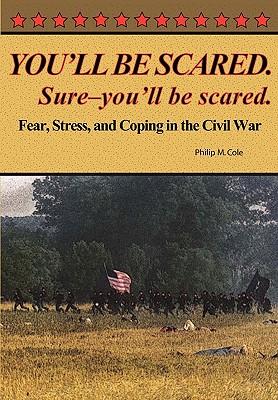...This work, likely to become quite popular, provides descriptions of every facet of fear soldiers involved in any major conflict might experience. Philip Cole dissects fear with an expertise that is hard to match. He takes an intangible emotion and breathes life into it. Fear influences our thoughts and actions frequently without our knowledge. Using this premise, he explores factors influencing fear. Additionally he describes the cause-and-effect relationship between fear and stress. Understanding these factors is extremely important in order for commanders to be effective. Weather, fatigue and lack of food, sleep and clothing all play an important part in how a soldier reacts during battle. Reactions during conflict are almost as different as the individuals fighting. Preparations made prior to battle may or may not alleviate certain fears. Actual combat almost always causes different fears. These not only include the fear of dying but also of being surrounded by death, isolation and loneliness... Many historians struggle to understand why Civil War soldiers were willing to make frontal assaults like Longstreet's Gettysburg attack, better known as "Pickett's Charge," where certain death appeared imminent. Cole provides a very good answer: the close-knit community among soldiers and good communication between leaders and subordinates... Another interesting observation is that Civil War soldiers suffered many of the same emotional and mental traumas that soldiers face in modern combat zones. This book appeals to a wide audience. It is reasonably priced, well written and extensively researched. The author makes learning how soldiers in combat overcome their fears a more enjoyable experience...
Reviewer for the Civil War News, Richard J. Blumberg, gives this book a "strong recommendation."

You'll Be Scared. Sure-You'll Be Scared - Fear, Stress, and Coping in the Civil War
...This work, likely to become quite popular, provides descriptions of every facet of fear soldiers involved in any major conflict might experience. Philip Cole dissects fear with an expertise that is hard to match. He takes an intangible emotion and breathes life into it. Fear influences our thoughts and actions frequently without our knowledge. Using this premise, he explores factors influencing fear. Additionally he describes the cause-and-effect relationship between fear and stress. Understanding these factors is extremely important in order for commanders to be effective. Weather, fatigue and lack of food, sleep and clothing all play an important part in how a soldier reacts during battle. Reactions during conflict are almost as different as the individuals fighting. Preparations made prior to battle may or may not alleviate certain fears. Actual combat almost always causes different fears. These not only include the fear of dying but also of being surrounded by death, isolation and loneliness... Many historians struggle to understand why Civil War soldiers were willing to make frontal assaults like Longstreet's Gettysburg attack, better known as "Pickett's Charge," where certain death appeared imminent. Cole provides a very good answer: the close-knit community among soldiers and good communication between leaders and subordinates... Another interesting observation is that Civil War soldiers suffered many of the same emotional and mental traumas that soldiers face in modern combat zones. This book appeals to a wide audience. It is reasonably priced, well written and extensively researched. The author makes learning how soldiers in combat overcome their fears a more enjoyable experience...
Reviewer for the Civil War News, Richard J. Blumberg, gives this book a "strong recommendation."